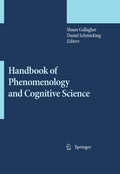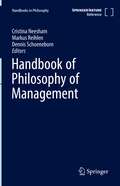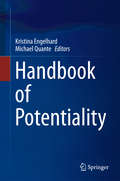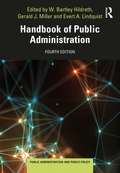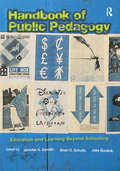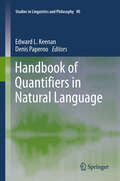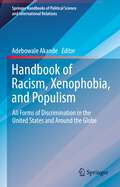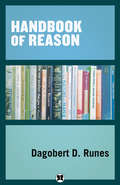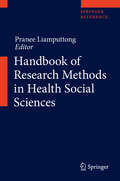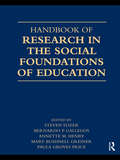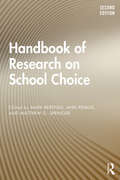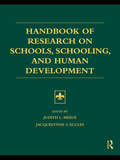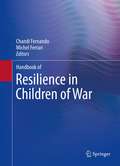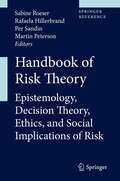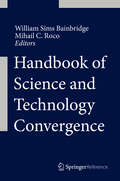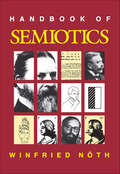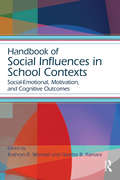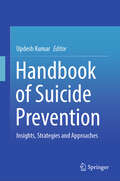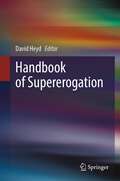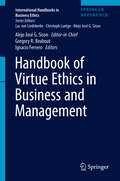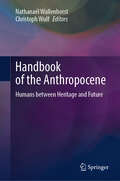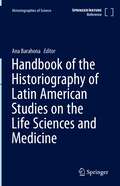- Table View
- List View
Handbook of Phenomenology and Cognitive Science
by Shaun Gallagher Daniel SchmickingThe idea that phenomenology, in the European tradition, has something to offer the cognitive sciences is a recent development. Here, leading researchers address topics that lie at the intersection between phenomenological studies and the cognitive sciences.
Handbook of Philosophical Logic: Volume 17
by Dov M. Gabbay Franz GuenthnerThis second edition of the Handbook of Philosophical Logic reflects great changes in the landscape of philosophical logic since the first edition. It gives readers an idea of that landscape and its relation to computer science and formal language and artificial intelligence. It shows how the increased demand for philosophical logic from computer science and artificial intelligence and computational linguistics accelerated the development of the subject directly and indirectly. This development in turn, directly pushed research forward, stimulated by the needs of applications. New logic areas became established and old areas were enriched and expanded. At the same time, it socially provided employment for generations of logicians residing in computer science, linguistics and electrical engineering departments which of course helped keep the logic community to thrive. The many contributors to this Handbook are active in these application areas and are among the most famous leading figures of applied philosophical logic of our times.
Handbook of Philosophy of Management (Handbooks in Philosophy)
by Markus Reihlen Dennis Schoeneborn Cristina NeeshamThe Handbook of Philosophy of Management addresses the philosophical foundations of management in theory and practice. It covers established branches of philosophy, such as aesthetics, epistemology, moral philosophy, political and social philosophy, philosophy of education, philosophy of practice, and philosophy of science. The Handbook’s broad scope maps out the field and provides a forum where philosophy can be meaningfully applied to the study of management in all its forms. The original, peer-reviewed research published here sheds new light on the complexities of management theory and practice, beyond what hitherto has been possible with the sole application of the social sciences. As philosophy provides a meta-framework for moving beyond paradigm fragmentation within management research and education, this allows researchers and practitioners to find harmony (and discord) in the perspectives revealed by a philosophical lens.
Handbook of Potentiality
by Michael Quante Kristina EngelhardThis volume congregates articles of leading philosophers about potentials and potentiality in all areas of philosophy and the empirical sciences in which they play a relevant role. It is the first encompassing collection of articles on the metaphysics of potentials and potentiality.Potentials play an important role not only in our everyday understanding of objects, persons and systems but also in the sciences. An example is the potential to become an adult human person. Moreover, the attribution of potentials involves crucial ethical problems. Bioethics makes references to the theoretical concept "potential" without being able to clarify its meaning. However, despite its relevance it has not been made subject of philosophical investigation. Mostly, potentials are regarded as a subspecies of dispositions. Whilst dispositions are a flourishing field of research, potentials as such have not come into focus. Potentials like dispositions are modal properties. But already a first glance at the metaphysics of potentials shows that concerning their ascription potentials are more problematic than dispositions since "potential" means that an entity has the potential to acquire a property in the future. Therefore, potentials involve a time structure of the entities in question that is much more complex than those of dispositions. This handbook brings this important concept into focus in its various aspects for the first time. It covers the history of the concept as well as contemporary systematic problems and will be of special interest for philosophers in the fields of general metaphysics, philosophy of science and ethics, especially bioethics. It will also be of interest to scientists and persons concerned with bioethical problems.
Handbook of Practical Logic and Automated Reasoning
by John HarrisonThe sheer complexity of computer systems has meant that automated reasoning, i. e. the ability of computers to perform logical inference, has become a vital component of program construction and of programming language design. This book meets the demand for a self-contained and broad-based account of the concepts, the machinery and the use of automated reasoning. The mathematical logic foundations are described in conjunction with practical application, all with the minimum of prerequisites. The approach is constructive, concrete and algorithmic: a key feature is that methods are described with reference to actual implementations (for which code is supplied) that readers can use, modify and experiment with. This book is ideally suited for those seeking a one-stop source for the general area of automated reasoning. It can be used as a reference, or as a place to learn the fundamentals, either in conjunction with advanced courses or for self study.
Handbook of Public Administration: Theory, Politics, And Methods (Public Administration and Public Policy #1)
by Gerald J. Miller W. Bartley Hildreth Evert A. LindquistPublic administration as a field of study finds itself in the middle of a fluid environment. The very reach and complexity of public administration has been easy to take for granted, easy to attack, and difficult to explain, particularly in the soundbite and Twitter-snipe media environment. Not only has the context for the discipline changed, but the institutions of public administration have adapted and innovated to deliver services to the public and serve those in power while becoming increasingly complex themselves. Has public administration evolved? And what new lines of research are critical for effective policy and delivery of programs and public services while preserving foundational principles such as the rule of law and expert institutions? This Handbook of Public Administration sheds light for new researchers, doctoral students, scholars, and practitioners interested in probing modern public administration’s role in solving major challenges facing nations and the world. This fourth edition recognizes that the scholarship of public administration must reflect the diverse influence of an international orientation, embracing public administration issues and practices in governance systems around the world, and illustrating just how practice can vary across jurisdictions. Every section identifies foundational principles and issues, shows variation in practice across selected jurisdictions, and identifies promising avenues for research. Each chapter revisits enduring themes and tensions, showing how they persist, along with new challenges and opportunities presented by digital technology and contemporary political realities. The Handbook of Public Administration, Fourth Edition provides a compelling introduction to and depiction of the contemporary realities of public administration, and it will inspire new avenues of inquiry for the next generation of public administration researchers.
Handbook of Public Pedagogy: Education and Learning Beyond Schooling (Studies in Curriculum Theory Series)
by Jennifer A. Sandlin Jake Burdick Brian D. SchultzBringing together scholars, public intellectuals, and activists from across the field of education, the Handbook of Public Pedagogy explores and maps the terrain of this burgeoning field. For the first time in one comprehensive volume, readers will be able to learn about the history and scope of the concept and practices of public pedagogy. What is 'public pedagogy'? What theories, research, aims, and values inform it? What does it look like in practice? Offering a wide range of differing, even diverging, perspectives on how the 'public' might operate as a pedagogical agent, this Handbook provides new ways of understanding educational practice, both within and without schools. It implores teachers, researchers, and theorists to reconsider their foundational understanding of what counts as pedagogy and of how and where the process of education occurs. The questions it raises and the critical analyses they require provide curriculum and educational workers and scholars at large with new ways of understanding educational practice, both within and without schools.
Handbook of Quantifiers in Natural Language
by Edward Keenan Denis PapernoCovering a strikingly diverse range of languages from 12 linguistic families, this handbook is based on responses to a questionnaire constructed by the editors. Focusing on the formation, distribution and semantic interpretation of quantificational expressions, the book explores 17 languages including German, Italian, Russian, Mandarin Chinese, Malagasy, Hebrew, Pima, Basque, and more. The language data sets enable detailed crosslinguistic comparison of numerous features. These include semantic classes of quantifiers (generalized existential, generalized universal, proportional, partitive), syntactically complex quantifiers (intensive modification, Boolean compounding, exception phrases) and several others such as quantifier scope ambiguities, quantifier float, and binary quantifiers. Its theory-independent content extends earlier work by Matthewson (2008) and Bach et al. (1995), making this handbook suitable for linguists, semanticians, philosophers of language and logicians alike.
Handbook of Racism, Xenophobia, and Populism: All Forms of Discrimination in the United States and Around the Globe (Springer Handbooks of Political Science and International Relations)
by Adebowale AkandeThis handbook presents the roots of symbolic racism as partly in both anti-black antagonism and non-racial conservative attitudes and values, representing a new form of racism independent of older racial and political attitudes. By doing so, it homes in on certain historical incidents and episodes and presents a cogent analysis of anti-black, Jim Crowism, anti-people of color (Black, Latino, Native Americans), and prejudice that exists in the United States and around the world as a central tenet of racism. The book exposes the reader to the nature and practice of stereotyping, negative bias, social categorization, modern forms of racism, immigration law empowerment, racialized incarceration, and police brutality in the American heartland. It states that several centuries of white Americans’ negative socializing culture marked by widespread negative attitudes toward African Americans, are not eradicated and are still rife. Further, the book provides a panoramic view of trends of racial discrimination and other negative and desperate challenges that Black, Indigenous, and People of Color face across the world. Finally, the volume examines xenophobia, racism, prejudice, and stereotyping in different contexts, including topics such as Covid-19, religion and racism, information manipulation, and populism. The book, therefore, is a must-read for students, researchers, and scholars of political science, psychology, history, sociology, communications/media studies, diplomatic studies, and law in general, as well as ethnic and racial studies, American politics, global affairs, populism, and discrimination in particular.
Handbook of Reason
by Dagobert D. RunesIn his most recent philosophical work, one of the modern world's pre-eminent thinkers offers a summation of his views on a wide range of topics of first and last importance, beginning with abstract art and ending with Zionism. Culled from years of patient research and fruitful introspection, his observations are bound to stimulate, challenge, and at times force upon the reader a shock of recognition grounded on timeless but at times obscured universal truths. Dr. Runes' word magic, now aphoristic, now cadenced and metaphorical, creates countless gems of wisdom, frequently poetic, often irresistibly quotable, always profoundly moving. A humanitarian theme evolved partly from personal tragedies permeates his lifelong search for "a life of God the Spirit and the Giver/(Of) God unbound and unencumbered/By hate or prejudice/A god to love by Deeds/Not hollow hymns and vows."
Handbook of Reason
by Dagobert D. RunesThe eminent philosopher presents a summation of his views on an encyclopedic range of topics from abstract art to Zionism.Culled from years of research and introspection, the diverse observations discussed in Handbook of Reason by Dagobert D. Runes are bound to stimulate, challenge, and at times force upon the reader a shock of recognition grounded in universal truths. In a style that moves from the aphoristic to the metaphorical, Runes offers countless gems of wisdom, often irresistibly quotable, and always profoundly moving. A humanitarian theme evolved partly from personal tragedies permeates his lifelong search for &“a life of God the Spirit and the Giver/(Of) God unbound and unencumbered/By hate or prejudice/A god to love by Deeds/Not hollow hymns and vows.&”
Handbook of Research Methods in Health Social Sciences
by Pranee LiamputtongResearch is defined by the Australian Research Council as “the creation of new knowledge and/or the use of existing knowledge in a new and creative way so as to generate new concepts, methodologies, inventions and understandings”. Research is thus the foundation for knowledge. It produces evidence and informs actions that can provide wider benefit to a society. The knowledge that researchers cultivate from a piece of research can be adopted for social and health programs that can improve the health and well-being of the individuals, their communities and the societies in which they live. As we have witnessed in all corners of the globe, research has become an endeavor that most of us in the health and social sciences cannot avoid. This Handbook is conceived to provide the foundation to readers who wish to embark on a research project in order to form knowledge that they need. The Handbook comprises four main sections: Traditional research methods sciences; Innovative research methods; Doing cross-cultural research; and Sensitive research methodology and approach. This Handbook attests to the diversity and richness of research methods in the health and social sciences. It will benefit many readers, particularly students and researchers who undertake research in health and social science areas. It is also valuable for the training needs of postgraduate students who wish to undertake research in cross-cultural settings, with special groups of people, as it provides essential knowledge not only on the methods of data collection but also salient issues that they need to know if they wish to succeed in their research endeavors.
Handbook of Research in the Social Foundations of Education
by Steven E. TozerParts one and two of this volume present the theoretical lenses used to study the social contexts of education. These include long-established foundations disciplines such as sociology of education and philosophy of education as well as newer theoretical perspectives such as critical race theory, feminist educational theory, and cultural studies in education. Parts three, four, and five demonstrate how these theoretical lenses are used to examine such phenomena as globalization, media, popular culture, technology, youth culture, and schooling. This groundbreaking volume helps readers understand the history, evolution, and significance of this wide-ranging, often misunderstood, and increasingly important field of study. This book is appropriate as a reference volume not only for scholars in the social foundations of education but also for scholars interested in the cultural contexts of teaching and learning (formal and informal). It is also appropriate as a textbook for graduate-level courses in Social Foundations of Education, School and Society, Educational Policy Studies, Cultural Studies in Education, and Curriculum and Instruction.
Handbook of Research on School Choice
Updated to reflect the latest developments and increasing scope of school-based options, the second edition of the Handbook of Research on School Choice makes readily available the most rigorous and policy-relevant research on K–12 school choice. This comprehensive research handbook begins with scholarly overviews that explore historical, political, economic, legal, methodological, and international perspectives on school choice. In the following sections, experts examine the research and current state of common forms of school choice: charter schools, school vouchers, and magnet schools. The concluding section brings together perspectives on other key topics such as accountability, tax credit scholarships, parent decision-making, and marginalized students. With empirical perspectives on all aspects of this evolving sphere of education, this is a critical resource for researchers, faculty, and students interested in education policy, the politics of education, and educational leadership.
Handbook of Research on Schools, Schooling and Human Development
by Judith L. MeeceChildren spend more time in school than in any social institution outside the home. And schools probably exert more influence on children’s development and life chances than any environment beyond the home and neighbourhood. The purpose of this book is to document some important ways schools influence children’s development and to describe various models and methods for studying schooling effects. Key features include: Comprehensive Coverage – this is the first book to provide a comprehensive review of what is known about schools as a context for human development. Topical coverage ranges from theoretical foundations to investigative methodologies and from classroom-level influences such as teacher-student relations to broader influences such as school organization and educational policies. Cross-Disciplinary – this volume brings together the divergent perspectives, methods and findings of scholars from a variety of disciplines, among them educational psychology, developmental psychology, school psychology, social psychology, psychiatry, sociology, and educational policy. Chapter Structure – to ensure continuity, chapter authors describe 1) how schooling influences are conceptualized 2) identify their theoretical and methodological approaches 3) discuss the strengths and weaknesses of existing research and 4) highlight implications for future research, practice, and policy. Methodologies – chapters included in the text feature various methodologies including longitudinal studies, hierarchical linear models, experimental and quasi-experimental designs, and mixed methods.
Handbook of Resilience in Children of War
by Michel Ferrari Chandi FernandoTheir frightened, angry faces are grim reminders of the reach of war. They are millions of children, orphaned, displaced, forced to flee or to fight. And just as they have myriad possibilities for trauma, their lives also hold great potential for recovery. The Handbook of Resilience in Children of War explores these critical phenomena at the theoretical, research, and treatment levels, beginning with the psychosocial effects of exposure to war. Narratives of young people's lives in war zones as diverse as Afghanistan, Sri Lanka, Columbia, and Sudan reveal the complexities of their experiences and the meanings they attach to them, providing valuable keys to their rehabilitation. Other chapters identify strengths and limitations of current interventions, and of constructs of resilience as applied to youth affected by war. Throughout this cutting-edge volume, the emphasis is on improving the field through more relevant research and accurate, evidence-based interventions, in such areas as: An ecological resilience approach to promoting mental health in children of war.Child soldiers and the myth of the ticking time bomb.The Child Friendly Spaces postwar intervention program.The role of education for war-zone immigrant and refugee students.Political violence, identity, and adjustment in children.The Handbook of Resilience in Children of War is essential reading for researchers, scientist-practitioners, and graduate students in diverse fields including clinical child, school, and developmental psychology; child and adolescent psychiatry; social work; counseling; education; and allied medical and public health disciplines.
Handbook of Risk Theory
by Martin Peterson Sabine Roeser Per Sandin Rafaela HillerbrandRisk has become one of the main topics in fields as diverse as engineering, medicine and economics, and it is also studied by social scientists, psychologists and legal scholars. But the topic of risk also leads to more fundamental questions such as: What is risk? What can decision theory contribute to the analysis of risk? What does the human perception of risk mean for society? How should we judge whether a risk is morally acceptable or not? Over the last couple of decades questions like these have attracted interest from philosophers and other scholars into risk theory. This handbook provides for an overview into key topics in a major new field of research. It addresses a wide range of topics, ranging from decision theory, risk perception to ethics and social implications of risk, and it also addresses specific case studies. It aims to promote communication and information among all those who are interested in theoetical issues concerning risk and uncertainty. This handbook brings together internationally leading philosophers and scholars from other disciplines who work on risk theory. The contributions are accessibly written and highly relevant to issues that are studied by risk scholars. We hope that the Handbook of Risk Theory will be a helpful starting point for all risk scholars who are interested in broadening and deepening their current perspectives.
Handbook of Science and Technology Convergence
by William Sims Bainbridge Mihail C. RocoScientists and engineers have long been aware of the tension between narrow specialization and multidisciplinary cooperation, but now a major transformation is in process that will require technical fields to combine far more effectively than formerly in the service of human benefit. This handbook will catalog all the ways this can be accomplished and the reasons it must be. Nature is a single coherent system and diverse methods of scientific and engineering investigations should reflect this interlinked and dynamic unity. Accordingly, general concepts and ideas should be developed systematically in interdependence, with cause-and-effect pathways, for improved outcomes in knowledge, technology and applications. At the same time, industrial and social applications rely on integration of disciplines and unification of knowledge. Thus, convergence is both a fundamental principle of nature and a timely opportunity for human progress. This handbook will represent the culmination of fifteen years of workshops, conferences and publications that initially explored the connections between nanotechnology, biotechnology, information technology and new technologies based on cognitive science. A constant emphasis on human benefit then drew in the social sciences, even as shared scientific and ethical principles brought in sustainability of the Earth environment and the challenge of equitable economic advancement. The intellectual contributions of literally hundreds of scientists and engineers established a number of research methods and analytical principles that could unite disparate fields. The culmination has been called Convergence of Knowledge and Technology for the benefit of Society (CKTS), defined as the escalating and transformative interactions among seemingly different disciplines, technologies, communities and domains of human activity to achieve mutual compatibility, synergism and integration.
Handbook of Semiotics (Advances in Semiotic)
by Winfried Nöth"This is the most systematic discussion of semiotics yet published." —Choice"A bravura performance." —Thomas Sebeok"Nöth's handbook is an outstanding encyclopedia that provides first-rate information on many facets of sign-related studies, research results, and applications." —Social Sciences in General
Handbook of Social Influences in School Contexts: Social-Emotional, Motivation, and Cognitive Outcomes (Educational Psychology Handbook)
by Kathryn R. Wentzel Geetha B. RamaniThe Handbook of Social Influences in School Contexts draws from a growing body of research on how and why various aspects of social relationships and contexts contribute to children’s social and academic functioning within school settings. Comprised of the latest studies in developmental and educational psychology, this comprehensive volume is perfect for researchers and students of Educational Psychology. Beginning with the theoretical perspectives that guide research on social influences, this book presents foundational research before moving on to chapters on peer influence and teacher influence. Next, the book addresses ways in which the school context can influence school-related outcomes (including peer and teacher-student relationships) with specific attention to research in motivation and cognition. Within the chapters authors not only present current research but also explore best-practices, drawing in examples from the classroom. With chapters from leading experts in the field, The Handbook of Social Influences in School Contexts provides the first complete resource on this topic.
Handbook of Suicide Prevention: Insights, Strategies and Approaches
by Updesh KumarThe Handbook of Suicide Prevention covers a broad range of topics related to suicidal behaviour, including its underlying causes, risk factors, prevention strategies, and therapeutic approaches. With contributions by renowned experts in the field, the volume brings forth the latest research and clinical insights into suicidal behaviour. It highlights evidence-based practices effective in reducing suicide risk. It provides a comprehensive overview of the multidimensional perspectives, including biological, psychological, and social factors contributing to suicidal ideation and behaviour. The book provides a nuanced and extensive understanding of how suicide risk and protective factors are shaped by social, cultural, and political contexts across the lifespan. The last section of the volume highlights the need for a multifaceted approach to suicide prevention by leveraging the latest technologies and therapeutic modalities while also addressing the social and cultural factors that contribute to suicide risk. Suicidal behaviour remains an intriguing phenomenon that demands addressing being among the leading causes of death worldwide. The handbook is a compilation of essential resources that offers a multitude of theoretical and compassionate approaches to understanding and addressing this complex phenomenon. Its practical guidance and evidence-based recommendations make it an essential reference for anyone working in suicide prevention, mental health and social work.
Handbook of Supererogation
by David HeydSupererogation is the category of moral actions which go beyond the call of duty. This collection of articles is the first of its kind to cover the broad spectrum of issues related to supererogation. It provides an up-to-date status of the discussion on the main issues, alternative analyses, and controversies regarding central cases of supererogation. The work explores a broad range of philosophical problems and challenges our presuppositions about the basis of ethical theories. Beyond the challenges of supererogation to deontological and utilitarian views, this book presents the latest developments in the way virtue ethics approaches supererogation. It also discusses the issue of whether there is a negative analogue to the supererogatory: the suberogatory. The Handbook consists also of the first systematic discussion of supererogation from the point of view of five religions as well as a feminist analysis of the concept. The book is an essential read for philosophy scholars interested in moral philosophy.
Handbook of Virtue Ethics in Business and Management (International Handbooks in Business Ethics #1)
by Alejo José G. Sison Gregory R. Beabout Ignacio FerreroThis volume examines the breadth and depth of virtue ethics and aims to counter the virtue ethics amnesia that both afflicts general moral philosophy and affects business and management ethics. Divided into two parts, the handbook starts out with a historical introduction and chronology of the development of virtue ethics, providing a comprehensive assessment of its evolution and identifying the most influential authors and their works. The authors discussed include those who follow a philosophical or conceptual tradition in their treatment of virtue and those who belong to the research tradition of positive science, in particular, empirical, quantitative and applied psychology. The second part of the book discusses systematic approaches and major themes developed in virtue ethics. These contributions are conceptual, empirical/applied or case studies. They offer insight into the different topics to which virtue ethics has been applied, and show how virtue ethics has influenced the various operational areas of firms. Finally, they examine the virtue ethics responses to some of the most important issues that businesses and organizations face in the 21st century.
Handbook of the Anthropocene: Humans between Heritage and Future
by Christoph Wulf Nathanaël WallenhorstThis Handbook is a collection of contributions of more than 300 researchers who have worked to grasp the Anthropocene, this new geological epoch characterised by a modification of the conditions of habitability of the Earth for all living things, in its biogeophysical and socio-political reality. These researchers also sought to define a historical and prospective anthropology that integrates social, economic, cultural and political issues as well as, of course, environmental ones. What are the anthropological changes needed to ensure that our human adventure will be able to continue in the Anthropocene? And what are the educational and political issues involved?Anthropocene is fast becoming a widely-used term, but thus far, there been no reference work explaining the thoughts of the greatest experts of the present day on this subject (at the intersection of biogeophysical and socio-political knowledge). A scientific and political concept (but which is also the conceptual vehicle for conveying the scientific community's sense of concern), this complex term is explained by international experts as they reflect on scientific arguments taking place in earth system science, the social sciences and the humanities. What these researchers from different disciplines have in common is a healthy concern for the future and how to prepare for it in the Anthropocene and also the identification of possible anthropological changes. This Handbook encourages readers to immerse themselves in reflections on the human adventure through descriptions of our differing heritages and the future that is in the process of being written.
Handbook of the Historiography of Latin American Studies on the Life Sciences and Medicine (Historiographies of Science)
by Ana BarahonaThis volume provides a definitive assessment of the historiography of the life sciences and medicine in Latin America. It makes historiographic work available for new scholars to join the field and for graduate students and other scholars new to the history of science in Latin America, by means of meaningful and original contributions.This volume brings transnational analysis to the center of global historiographical discussions. It seeks to contribute both empirically and theoretically to the fields of History of Science and Science and Technology Studies (STS) in Latin America, to account for how the knowledge produced in developing countries is part of international knowledge as it circulates in transnational collaborative networks. The volume consists of articles written by experienced, expert authors who expose the lines of ongoing research in the history of life sciences and medicine in Latin America in order to provide an overview of the multiplicity of analytic frameworks and perspectives in a way that allows them to be contrasted with each other. Some of the topics discussed include Asymmetrical networks of collaboration, Circulation of Knowledge, Conceptual History, History and Art, History of Race, Gender and the like, and many more.
